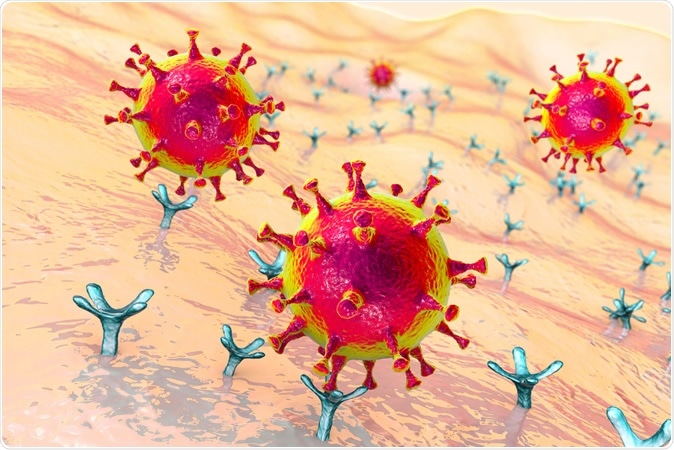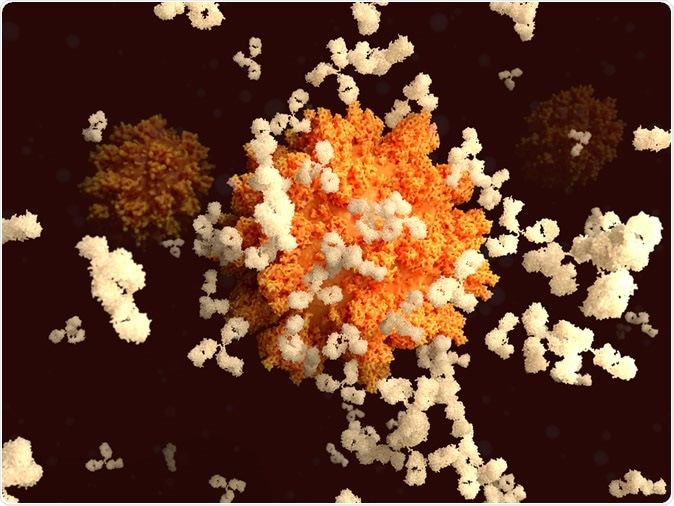Genetic variants in the angiotensin‐converting enzyme 2 (ACE2) receptor, utilized by the severe acute respiratory syndrome coronavirus 2 (SARS‐CoV‐2) for cell entry, are predicted to either encourage or inhibit interaction with viral proteins and subsequently contribute to genetic risk in coronavirus disease (COVID-19). This is the key finding of a new study available on the preprint server bioRxiv*.
Although the disease caused by the SARS-CoV-2 usually presents with mild symptoms, it can progress to severe illness and even death. Consequently, the ongoing COVID-19 pandemic is one of the most significant global public health challenges of a modern era.
It is known that SARS-CoV-2 invades human cells via an endocytic pathway that starts with the interaction of the SARS-CoV-2 Spike glycoprotein (S-protein) and human ACE2 receptor. Although it was postulated that genetic variability in ACE2 might be one of the factors that influence the broad-spectrum severity of COVID-19 outcomes, it has never been researched in more depth.

SARS-CoV-2 viruses binding to ACE-2 receptors on a human cell, the initial stage of COVID-19 infection, conceptual 3D illustration Credit: Kateryna Kon / Shutterstock

 This news article was a review of a preliminary scientific report that had not undergone peer-review at the time of publication. Since its initial publication, the scientific report has now been peer reviewed and accepted for publication in a Scientific Journal. Links to the preliminary and peer-reviewed reports are available in the Sources section at the bottom of this article. View Sources
This news article was a review of a preliminary scientific report that had not undergone peer-review at the time of publication. Since its initial publication, the scientific report has now been peer reviewed and accepted for publication in a Scientific Journal. Links to the preliminary and peer-reviewed reports are available in the Sources section at the bottom of this article. View Sources
This is why Professor Geoffrey J. Barton and Dr. Stuart A. MacGowan from the Division of Computational Biology, School of Life Sciences of the University of Dundee, decided to investigate the capacity of ACE2 variation to influence SARS-CoV-2 infection.
Their focus was on predicting the consequence of missense variants on the ACE2 SARS-CoV-2 S-protein interaction. Missense mutations basically arise when a change of a single base pair results in different amino acids in the protein, which can then exhibit further downstream effects.

Binding of antibodies to the spike (S)-protein of the SARS-CoV-2 virus is an essential step for developing immunity to the coronavirus. Illustration Credit: Juan Gaertner / Shutterstock
And the most straightforward way that missense variation could impact SARS-CoV-2 infection would be by altering the ACE2-S interface. As a result, it can either inhibit or promote the interaction between the ACE2 receptor and S-protein of the SARS-CoV-2, influencing the course and outcome of the infection.
Using computers and databases to explore interactions
Protein-protein interactions are implicated in a large number of fundamental biological processes, with disease-causing mutations enhanced at their interfaces. A novel computational tool mCSM-PPI2 was designed to more precisely predict the effects of missense on interaction binding affinity.
This research group validated the mCSM-PPI2 variant effect prediction algorithm with 26 published ACE2 mutant SARS-CoV S-protein binding assays and discovered it performed well in this closely related system. The binding site was shown to be quite important for maintaining the interaction between the proteins.
Furthermore, by using the Genome Aggregation Consortium Database (gnomAD), they found three missense variants that inhibited the S-protein ACE2 interaction altogether, and one that was promoting such interaction.
The researchers have also performed in silico saturation mutagenesis of the S-protein ACE2 interface and pinpointed an additional 38 missense mutations that could lead to strong inhibition of binding and one more that is likely to enhance binding. In short, the result of the mutations can go either way, although they more often hamper viral binding.
The prevalence and significance of protective mutations
A conservative estimate of strongly protective variant prevalence is between 12 and 70 per 100 thousand people; however, there is the possibility that the prevalence is even higher in certain local populations or those underrepresented in gnomAD.
"Aside from ACE2-S affinity, host cell ACE2 expression levels are known to be important for the cellular specificity of SARS-CoV-2, and attention has been directed toward ACE2 expression levels as a potential factor in COVID-19 susceptibility and severity", further explain study authors.
Different epidemiological features are also in line with this research. For example, already perceived gender difference in COVID-19 pandemic (i.e., men dying more often) may arise from the ACE2's position on the X chromosome, increasing the expression of certain S-protein resistant ACE2 alleles in women (if present).
In any case, this type of saturation mutant predictions can aid in designing a mutant ACE2 with tailored S-protein affinity as a significant step forward when compared to a current recombinant ACE2 that is undergoing clinical trial.
Paving the way for genetic medicine
"Our validation of mCSM-PPI2 with experimental data from the closely related SARS-CoV S-ACE2 complex provides direct evidence that this algorithm yields accurate predictions for this complex and calibrates the algorithm's quantitative predictions with observed physical behavior", say study authors.
"Additionally, we have followed up key results with a critical structural inspection of the local environments of the mutant models, and in our judgment, the predictions are in line with the principles established by the original structural and mutagenesis work in this area," they add.
Potential consequences of this research endeavor are prioritizing experimental work into virus-receptor recognition, developing genetic diagnostic risk profiling for COVID-19 sensitivity and severity, enhancing detection and interpretation in future genetic association studies, as well as developing novel therapeutic agents for COVID-19.

 This news article was a review of a preliminary scientific report that had not undergone peer-review at the time of publication. Since its initial publication, the scientific report has now been peer reviewed and accepted for publication in a Scientific Journal. Links to the preliminary and peer-reviewed reports are available in the Sources section at the bottom of this article. View Sources
This news article was a review of a preliminary scientific report that had not undergone peer-review at the time of publication. Since its initial publication, the scientific report has now been peer reviewed and accepted for publication in a Scientific Journal. Links to the preliminary and peer-reviewed reports are available in the Sources section at the bottom of this article. View Sources
Journal references:
- Preliminary scientific report.
MacGowan, S.A. & Barton, G.J. (2020). Missense variants in ACE2 are predicted to encourage and inhibit interaction with SARS-CoV-2 Spike and contribute to genetic risk in COVID-19. bioRxiv. https://doi.org/10.1101/2020.05.03.074781.
- Peer reviewed and published scientific report.
MacGowan, Stuart A., Michael I. Barton, Mikhail Kutuzov, Omer Dushek, P. Anton van der Merwe, and Geoffrey J. Barton. 2022. “Missense Variants in Human ACE2 Strongly Affect Binding to SARS-CoV-2 Spike Providing a Mechanism for ACE2 Mediated Genetic Risk in Covid-19: A Case Study in Affinity Predictions of Interface Variants.” Edited by Charlotte M. Deane. PLOS Computational Biology 18 (3): e1009922. https://doi.org/10.1371/journal.pcbi.1009922, https://journals.plos.org/ploscompbiol/article?id=10.1371/journal.pcbi.1009922